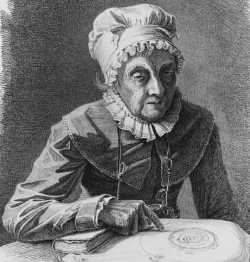 SKC Films Library SKC Films Library |
| SKC Films Library >> Science >> Astronomy >> Biography |
| Caroline Herschel the first woman astronomer to earn a salary, acquire honors, and be accepted into scientific organizations
Karoline Lucretia Herschel was born in Hanover, Germany, on March 16, 1750, the eighth of ten children born to Isaak and Anna Ilse Moritzen Herschel. At the age of 10 she was struck by typhus, which scarred her face and stunted her growth (she stopped growing at a height of four foot three). Her parents assumed she would never marry and that she should be trained as a house servant. Denied a formal education as a result, Herschel was only able to acquire a basic knowledge of reading and writing because her father allowed her to sit in on her brother William's tutoring sessions (which only happened when her mother wasn't in the house). After the death of Isaak Herschel in 1772, William Herschel talked his sister into becoming his housekeeper in Bath, England, where he had gained fame as an organist, conductor, and music teacher. William compensated Caroline for her services by teaching her how to sing, and she soon became an accomplished soprano; she would only sing at concerts conducted by William, however. After William Herschel gave up music to pursue his interest in astronomy, he taught Caroline how to polish mirrors for his telescopes, a task she became very good at. He also taught her how to record his observations, and how to perform the mathematical calculations those observations required. Caroline stayed on as William's housekeeper and assistant after he became Royal Astronomer in 1782, and by 1783 she was conducting observations on her own. On February 26, 1783, she discovered an open star cluster (known today as NGC 2360), and by the end of the year had discovered two more. On August 1, 1786, Caroline identified an object traveling slowly through the night sky. She observed it again the next night and immediately alerted other astronomers by mail to announce her discovery and inform them of its path so that they could study it, and she is now recognized as the first woman to discover a comet. That discovery earned her a salary as William's apprentice, making her the first woman to ever be paid for her services to science. By the time of her death she had discovered a total of eight comets (all of them named after her) and had rediscovered Comet Encke (in 1795). In 1788, her brother William married, freeing Caroline from many of her household duties. By 1797, William and Caroline’s observations had highlighted a number of discrepancies in the star catalogue published by John Flamsteed, which was complicated to use because it was published as two volumes, the catalogue proper, and a volume of original observations. William realized that he needed a cross-index in order to properly explore these differences, but was reluctant to devote time to it at the expense of his more interesting astronomical activities. Caroline took on this ardous task, which resulted in the Catalogue of Stars, published by the Royal Society in 1798. It contained an index of every observation of every star made by Flamsteed, a list of errata, and a list of more than 560 stars that had not been included in the first catalogue. Caroline returned to Germany after William's death in 1822, but did not give up her astronomical work. The Royal Astronomical Society was so impressed with her work that she was awarded the Gold Medal in 1828, and was admitted to the society as an honorary member in 1835; no woman was awarded the Gold Medal again until 1996. In 1838 she was also elected as a member of the Royal Irish Academy, and at age 96 she was awarded the Gold Medal for Science by the King of Prussia. Caroline Herschel died in Hanover, Germany, on January 9, 1848. WEB SOURCES SEE ALSO |
| SKC Films Library
>> Science >> Astronomy >> Biography This page was last updated on 06/06/2017. |
